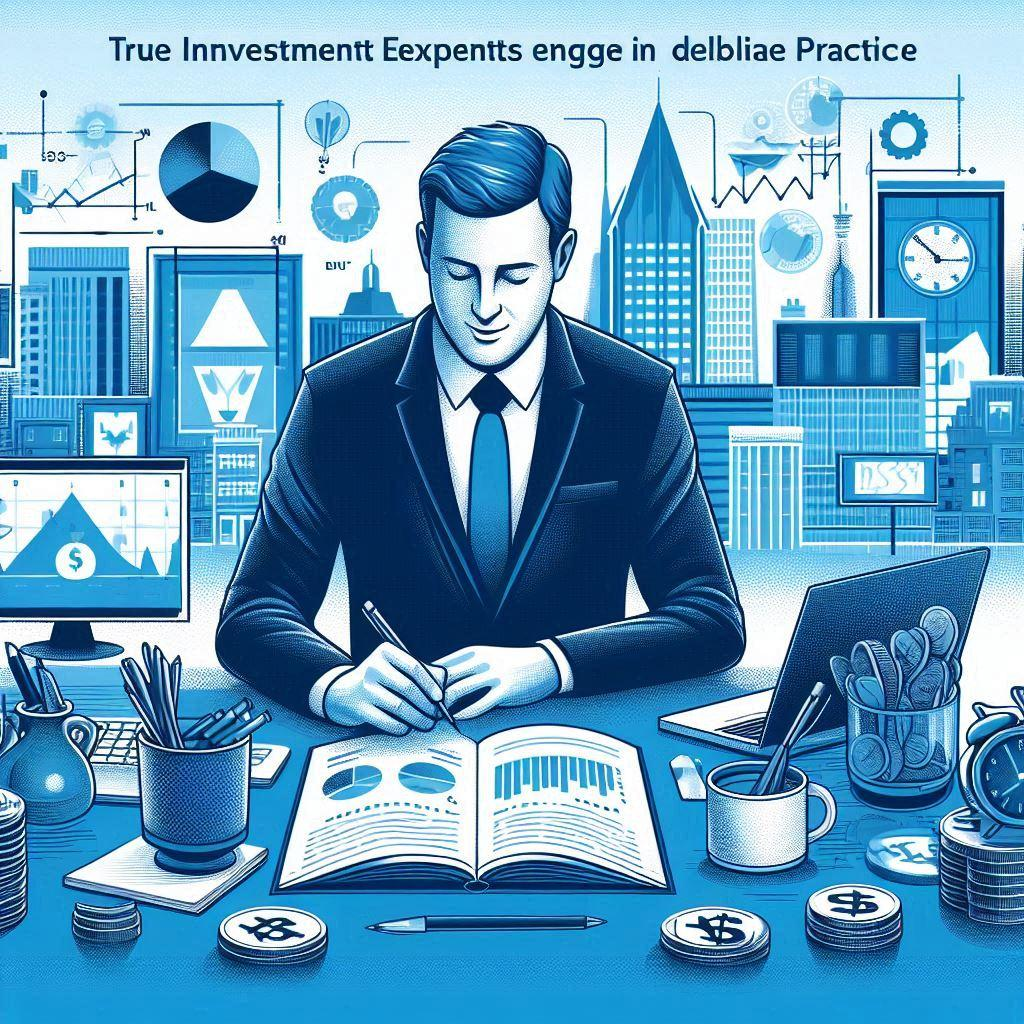15
2024/10
True Investment Experts Engage in Deliberate Practice
When faced with industry challenges, why can some people quickly grasp the essence of a problem, while others struggle to understand? Some say the former are experts, while the latter are beginners. So, how does an ordinary person progress from novice to expert?

Many believe the answer lies in practice. Experts are not born with extraordinary talent but achieve excellence through continuous effort. It’s often said that with 10,000 hours of practice, anyone can transition from a beginner to an expert.
However, the truth is that the “10,000-hour rule” doesn’t actually exist. For instance, a person who has worked on an assembly line for ten years may be more skilled than someone who has worked for just one year, but the difference may not be significant beyond just being faster or more efficient. True mastery doesn’t come from repetitive practice at a low level; it comes from deliberate practice.
01 Naive Practice vs. Purposeful Practice
When learning a skill, we typically follow these steps:
- First, we get a general understanding of what we want to achieve through a mentor, coach, book, or website.
- Then, we practice until we reach an acceptable level and the skill becomes automatic.
But here’s something crucial: once we reach a level of proficiency where we can perform the skill effortlessly, we stop improving. This misconception leads many to believe that with continued practice, improvement will follow, even if progress is slow.
For example, many think that a driver with 20 years of experience is better than someone with just 5 years of experience; a doctor practicing for 20 years is better than one practicing for 5; or a teacher with 20 years of teaching is superior to someone with just 5 years of experience.
Likewise, it’s often assumed that someone with 20 years of investment experience is better at analyzing markets than someone with just 5 years. Yet, research shows that once a person’s performance reaches a satisfactory level and becomes automatic, no further progress is made, regardless of how many more years they continue practicing.
In fact, an investor with 20 years of experience might even perform worse than one with just 5 years if they haven’t deliberately sought improvement. Automatic behaviors alone do not lead to better outcomes. To break free from this stagnation, we need purposeful learning rather than just going through the motions.

Characteristics of Purposeful Learning
- Specific Goals
Purposeful practice involves setting specific, well-defined goals. For example, an overall goal for an ordinary investor might be to achieve stable asset growth through investments. However, this broad goal needs to be broken down into more specific, actionable objectives. To achieve the desired return on investment, what steps are necessary? For instance, one goal could be to increase the number of successful stock picks and timing decisions. This is a concrete goal, but even this needs to be further broken down. What areas need improvement in stock selection and timing? Identifying past mistakes and addressing them is crucial for improvement. - Focused Attention
Effective progress requires full concentration on the task. Deliberate practice is not passive; it demands your full engagement. - Feedback
Knowing whether you are doing something correctly is essential. Feedback helps identify areas of weakness and how to improve. Without feedback (either self-reflection or from an external source), it’s impossible to know what needs improvement or how close you are to achieving your goals. - Stepping Out of Your Comfort Zone
Progress only happens when you push beyond your comfort zone. For example, an investor who has used the same analysis methods for years without evolving their approach may accumulate experience, but their investment results won’t necessarily improve. In fact, they might even decline. Experience doesn’t equal expertise unless you continually challenge yourself.

02 The Difference Between Experts and Ordinary People: Psychological Representation
1.What is Psychological Representation?
Psychological representation is the mental structure that corresponds to what we are thinking about. It could be something specific or abstract, such as information about a stock, company performance, or market trends. These mental representations help people process information efficiently and make better decisions.
2.How Psychological Representation Defines Experts
The key difference between experts and ordinary people lies in the quality and quantity of their mental representations. Through years of practice, experts develop highly detailed and accurate representations of various scenarios they might encounter. These representations allow them to make faster and more accurate decisions, especially in complex situations.
3.Key Characteristics of Psychological Representation:
- Helps identify patterns.
- Aids in interpreting information.
- Organizes information effectively.
- Assists in planning.
- Enhances learning efficiency.
03 How to Engage in Deliberate Practice
For investors, deliberate practice can involve the following:
1.Learn from Experts
Finding a knowledgeable mentor is invaluable. A mentor can guide you through the complexities of investing and help refine your skills through a systematic approach.
2.Push Beyond the Comfort Zone
Investors need to challenge their existing thought patterns and continuously upgrade their skills to stay relevant.
3.Set Clear Goals
Goals should be specific and measurable, focusing on improving particular investment strategies or increasing portfolio performance.
4.Fully Engage
Deliberate practice requires active, conscious effort and should not be left to autopilot decision-making.
5.Build Effective Psychological Representations
The more complex and detailed an investor’s mental models are, the better their decision-making. Using tools like quantitative analysis can help refine these mental models and identify market patterns.
6.Target Weak Areas
Focus on areas that need improvement, whether it’s learning new skills or refining existing ones. Over time, these small, incremental improvements will lead to exceptional performance.

In conclusion, the majority of investment success is built on “common sense.” However, fewer than 10% of investors truly grasp this foundation of knowledge.

Achieve Trading Success with WisunoFx
Success in trading is not just about skill and knowledge; it’s also about patience and discipline.
Experience excellence with Wisunofx, your premier destination for online trading solutions! With years of industry experience and a commitment to excellence, we deliver superior value to our clients, combining cutting-edge technology with personalized service to meet their unique trading needs.
Our platform offers a wide range of tradeable instruments, including currencies, commodities, and indices, with ultra-fast execution, competitive pricing, and deep liquidity, ensuring you can seize opportunities in the ever-changing financial markets.
At Wisunofx, we prioritize providing a secure and transparent trading environment with industry-leading encryption technology and strict regulatory compliance measures to safeguard your funds.
Start your journey toward trading success and join the thousands of clients who are already growing their wealth with confidence by opening a live account with WisunoFx today at:
https://tw.wsncrmc.com/register/trader/multi-step
Note: Trading financial products involves high risks and may not be suitable for all investors. Please ensure you fully understand the risks and implement appropriate management measures.





